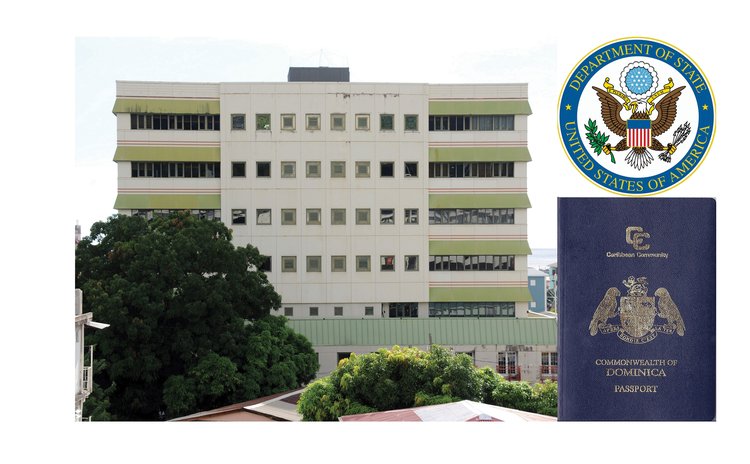US point to CBI weaknesses
In its latest report the US state department says Dominica's Citizenship by Investment programme poses money laundering risks

In its latest report the US state department says Dominica's Citizenship by Investment programme poses money laundering risks
It is a revelation that is sure to ruffle official feathers and embolden critics of the Roosevelt Skerrit administration.
The United States state department has flagged the controversial Citizenship by Investment (CBI) programme as one that poses security risks for the region, and is open to exploitation by criminals.
"Dominica's CIP [Citizenship by Investment programme] has vulnerabilities that present AML [anti-money laundering] and regional security risks and that may make it susceptible to abuse by criminal actors," the state department said in the just released International Narcotics Control Strategy Report on Money Laundering and Financial Crimes Volume II, who lists Dominica as a "major money laundering country in 2016" .
The over 200-page report on 88 countries dedicated just a few sentences to the passport programme - described recently by the American television network, CBS, in its popular 60 Minutes programme as "mail order citizenship" - focussing on the official cost to purchase Dominican citizenship. It makes reference to the fact that there are no residency requirements and no mandatory interviews for applicants.
Government recently launched a massive public relations campaign touting the CBI as Dominica's economic saviour, by holding a series of town hall meetings, and more recently, a consultation on economic development last Monday, at which financial secretary Rosamund Edwards was at pains to defend the programme by insisting that its strength lay in the quality of due diligence carried out on applicants.
Her assurances will surely be dismissed with derisive laughter by those who question how a number of high profile criminals, including the Iranian Alireza Monfared and former Nigerian oil minister Diezani Alison-Madueke, got their hands on Dominican passports. The critics will see the concerns raised by the US government as proof that there is something wrong with the way the programme is being managed.
It was not immediately clear if the Skerrit administration had been given advanced notice of the report, and if this would have played a part in the decision to launch the public relations offensive.
However, one foreign relations expert familiar with diplomatic protocol told The Sun it was unlikely that Washington would have published the report without first alerting government.
"The state department report tends to be deliberately general in nature, but they are speaking to Dominican officials. I have no doubt they have raised it [with government]," said the official, who spoke on condition of anonymity because of the controversial nature of the issue.
"The irony of it all is that the opposition supports CBI," added the official, who believes the programme should be scrapped in favour of more sustainable economic activities.
"Right now, in the short term it might well be bringing in money, but you know what I fear? These foreigners will buy up the country and Dominicans will not be able to buy land anymore. I am so fearful of what will happen to Dominica in the long term. Skerrit and them don't care, they are only living for today," he said.
The US government report places Dominica alongside countries such as Afghanistan, Canada, Iran, Iraq, Nigeria, North Korea, Pakistan, Russia and the United Kingdom as major money laundering countries.
Several Caribbean countries, including Antigua and Barbuda, Aruba, Bahamas, Barbados, Belize, British Virgin Islands, Cayman Islands, Cuba, Curacao, Dominican Republic, Grenada, Guyana, Haiti, Jamaica, St. Maarten, St. Kitts and Nevis, St. Lucia, St. Vincent and the Grenadines, and Trinidad and Tobago were also included in the report, although the US was left out.
It says Dominica has achieved technical compliance with international anti money laundering standards and has enacted comprehensive anti-money laundering laws and regulations, and is not currently subjected to any US or international sanctions.
However, it questions whether the island has the ability to maintain statistics on matters relevant to the effectiveness and efficiency of its anti-money laundering regime and points out that government is not monitoring agents licenced to incorporate international business centres.
"Money laundering cases involve external proceeds from fraudulent investment schemes, advance fee fraud schemes, and the placement of euros related to questionable activities conducted in other surrounding jurisdictions. Domestic money laundering is chiefly linked to narcotics activities," it says.
"Due to its geographical location [between Martinique and Guadeloupe], the country is used as a trans-shipment point for narcotics and other criminal activities. For the past few years, money laundering cases involved fraudulent investment schemes, advance fee fraud schemes, credit card fraud schemes and the placement of euros from criminal activities into the financial system from the neighbouring French territories of Marie Galante, Les Saintes, Guadeloupe, and Martinique .. .the porous borders pose a great challenge to law enforcement officials in effectively policing the various coastlines for drugs and smuggling of goods such as firearms and cash," it states.




